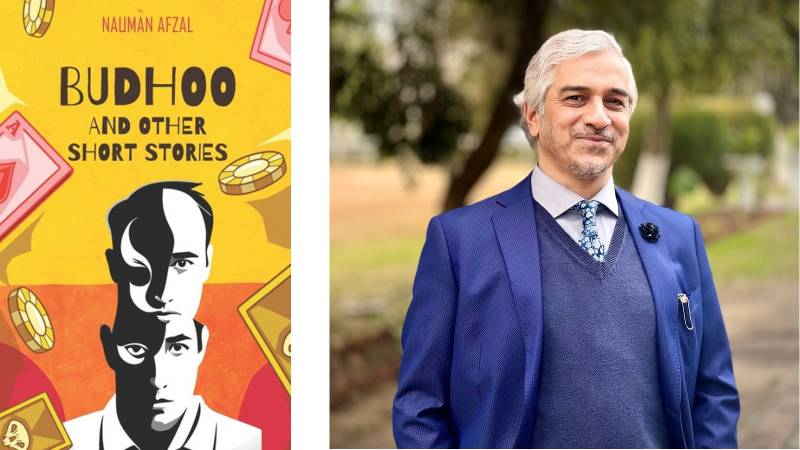
Nauman Afzal’s second book Budhoo and Other Short Stories paints a microcosm of our society. His second collection contains 13 stories, all symbolically significant, yet conventionally realistic. The typical essence of Pakistan is painted with all hues of its customs and traditions. The stories are diverse, indicating the writer’s keen observation of life in all its colours, shades and hues. Therefore, they are loaded with wisdom of observation and experience. The sophistication of these stories lies in the sheer simplicity of narration and plot. As Leonardo da Vinci rightly said, “Simplicity is the ultimate sophistication.”
Before delving further into the text, it is critical to understand the title of the book – Budhoo – which means foolish to an extent that causes moral degradation in the society at large. Some characters are the real bhudoos, some feign bhudhoo-ness to one’s advantage, and some are forcibly made budhoo. The subject matter of budhoo is knitted in almost all the stories. Moreover, despite the obvious differences in the stories, there are still through lines, for instance, other than budhoo, the themes of patriarchy, hypocrisy, greed, lust for power and envy.
It begins with the story titled “Budhoo,” wherein the protagonist’s hamartia of superiority has him in an abyss of embarrassment. The air of superiority brings him down in a jiffy. The epiphany of him being the real Budhoo in the end leaves him totally flabbergasted.
“Chai piyo gi” is a blistering critique of workplaces. It revolves around a narcissist psychopath boss who inflicts his subordinates with the torture of harassment and they are hushed by his overwhelming authority. It represents the appalling state of those workplaces where money under the table is the norm.
“Kitty party” packs quite a punch. Entertainment, fun and relaxation pop up in one’s mind when one hears the phrase ‘kitty party.’ However, in this kitty party, Afzal has turned topsy-turvy the very essence of it incorporating sermon and thus exposing the hypocrisy of the womenfolk.
“Postee” is a light hearted story yet full of suspense. It details the character living in the lap of luxuries. It makes one inquisitive about his coming tryst with his beloved. And then – I don’t want to spoil the suspense!
The writer has knitted the story of Tania and the tragic story of Rudaba on bitter truths. Tania and Rudaba are portrayed as cogs in the wheels of the patriarchal system. The concepts - the denial of agency and denial of voice – from Gayatri Chakravorty Spivak’s essay “Can the Subaltern Speak?” – befittingly elucidate their poor state. Moreover, the perpetual predicament of the peripheries has vividly been accentuated in “Chai piyo gi,” “NOC,” and “Je t’aime.” The writer prods until the cracks begin to appear. He shows them within the context of their restrictions and dilemmas, and in this manner, he lays bare the cruelty of male chauvinism. He highlights the mundane issues in a thought-provoking manner. They are mundane in the sense that we have heard of them since time immemorial but unfortunately, they are not tackled. Instead, they have been relegated to the ambit of mundane issues, not matters to be reckoned with.
“Backstabber” is an enlightening story. The character feigns budhoo-ness and procures information from every corner of the office; uses it to his advantage and thus backstabs his colleagues.
“Trans Temporal Traveler” is a gripping narrative. This story is a great reminder about living with ease in the present. However, the character is tempted to go beyond time where going back makes him rich and jubilant but the unrecognisable realm ruins his present. Not to mention that blue eyes in “Trans Temporal Traveler” remind one of the blue eyes in The Tale Heart by Edgar Allen Poe, though the effect of the eyes in stories has a huge difference in terms of repercussions; however, it acts as a temptation.
The title of “The Extension Cable” is highly symbolic. It is a seriocomic narrative that captures the country's conundrum. In a nutshell, the extension cable is broadly suggestive of the sad state of a nation.
His stories possess the quality of lightness, but it is deeper than it first appears. Get a copy and embark on a voyage through his amazing storytelling.

